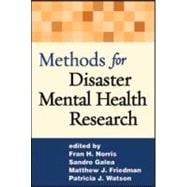This authoritative book will be of interest to anyone involved in studying the mental health consequences of large-scale traumatic events or in measuring the effectiveness of postdisaster interventions. The book considers disasters from different perspectives and translates their chaotic aftermath into feasible research ideas and approaches. Contributing authors, all experienced researchers and practitioners, present a wide range of methods and strategies used in epidemiology, program evaluation, and public mental health planning in the aftermath of natural or technological disasters and terrorism. Descriptions of exemplary studies bring to life the associated logistical and scientific challenges and show how these challenges can be addressed using high-quality research designs.








